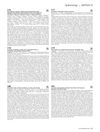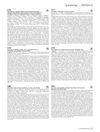 3 citations,
September 2014 in “Journal of obstetrics and gynaecology Canada”
3 citations,
September 2014 in “Journal of obstetrics and gynaecology Canada” Menopause often leads to lower sexual desire and discomfort during sex, but treatment should be personalized and only if it bothers the woman.
 April 2019 in “Journal of Investigative Dermatology”
April 2019 in “Journal of Investigative Dermatology” Allergens show specific patterns related to season, gender, and age, which can help in developing allergy avoidance plans.
 4 citations,
June 2006 in “Primary Care”
4 citations,
June 2006 in “Primary Care” The document recommends a team-based approach and personalized care for managing diabetes in teenagers.
 April 2019 in “Journal of Investigative Dermatology”
April 2019 in “Journal of Investigative Dermatology” The PROCLIPI study found markers that help predict outcomes in skin lymphoma patients.
 January 2009 in “Springer eBooks”
January 2009 in “Springer eBooks” The document concludes that treating skin conditions should include psychological care and a multidisciplinary approach is essential for effective management.
 September 2016 in “Princeton University Press eBooks”
September 2016 in “Princeton University Press eBooks” The document concludes that understanding health requires considering evolutionary perspectives on reproductive fitness, and recognizing the complexity of factors like diet, testosterone, and sexual orientation.
 15 citations,
September 2021 in “Frontiers in Endocrinology”
15 citations,
September 2021 in “Frontiers in Endocrinology” Hormone therapy increases the risk of heart-related issues in transgender women and may affect heart health in transgender men.
 1 citations,
January 2020 in “Elsevier eBooks”
1 citations,
January 2020 in “Elsevier eBooks” Forensic medicine is crucial for justice and needs continuous innovation and technology integration.

Celiac disease requires more than just a gluten-free diet for effective management.
 April 2023 in “JOJ dermatology & cosmetics”
April 2023 in “JOJ dermatology & cosmetics” The conclusion is that a team of skin doctors and psychiatrists is needed to better treat patients with mind-skin disorders.

Drinking sweetened tea and late bedtimes increase the risk of hair loss in women.
 December 2023 in “Advances in economics, management and political sciences”
December 2023 in “Advances in economics, management and political sciences” Consumers prefer general hair care products over those specifically for hair loss.

Drinking sweetened tea and poor sleep habits increase the risk of hair loss in women.
 31 citations,
August 2022 in “Frontiers in Oncology”
31 citations,
August 2022 in “Frontiers in Oncology” Photobiomodulation therapy helps manage cancer treatment side effects but needs more research for optimization.

Drinking sweetened tea and poor sleep habits may increase the risk of hair loss in women.

Drinking sweetened tea and late bedtimes increase the risk of hair loss in women.

Drinking sweetened tea and poor sleep increase the risk of hair loss in women.
 41 citations,
June 2018 in “Medicine Health Care and Philosophy”
41 citations,
June 2018 in “Medicine Health Care and Philosophy” The article suggests using four questions to tell apart necessary medicalization from excessive medicalization, focusing on problem significance, social expectations, medical understanding, and effective resolution.
 2295 citations,
August 2012 in “The international journal of transgenderism/International journal of transgenderism”
2295 citations,
August 2012 in “The international journal of transgenderism/International journal of transgenderism” The guidelines recommend informed consent for gender-affirming treatments and stress the importance of personalized, culturally sensitive care for transgender individuals.
 December 2023 in “The journal of physical chemistry. B (1997 : Online)”
December 2023 in “The journal of physical chemistry. B (1997 : Online)” Human hair keratin might be good for filtering out harmful substances from water.
 December 2024 in “Journal of Education Health and Sport”
December 2024 in “Journal of Education Health and Sport” Too much sugar harms skin, causing wrinkles and acne, but a low-sugar diet can help.
April 2024 in “International journal of molecular sciences” Combination pharmacotherapy is generally more effective for treating keloids and hypertrophic scars.
 2 citations,
January 2020 in “International Journal of Medical Sciences”
2 citations,
January 2020 in “International Journal of Medical Sciences” Avoid alcohol, ponytails, and oily scalp, and get good sleep to prevent severe hair loss.
 July 2023 in “Research Square (Research Square)”
July 2023 in “Research Square (Research Square)” Certain gut bacteria may protect against alopecia areata, while others may increase the risk.
 266 citations,
November 2013 in “European Journal of Epidemiology”
266 citations,
November 2013 in “European Journal of Epidemiology” The Rotterdam Study aims to understand disease causes in the elderly and has found new risk factors and genetic influences on various conditions.
 6 citations,
June 2021 in “Journal of health psychology”
6 citations,
June 2021 in “Journal of health psychology” The article suggests that the view of male baldness as a medical issue is influenced by commercial bias and calls for more unbiased research.
 April 2019 in “Journal of Investigative Dermatology”
April 2019 in “Journal of Investigative Dermatology” Young, lower-income men are more likely to visit the emergency department for severe sunburns, especially in the summer and on weekends.
 22 citations,
November 2014 in “Psychiatric Clinics of North America”
22 citations,
November 2014 in “Psychiatric Clinics of North America” Stress can worsen skin conditions and affect mental health, so doctors should include stress management in skin treatment.
December 2024 in “Journal of Clinical Medicine” PCOS and eating disorders are linked by hormonal imbalances, needing personalized treatment.
 2 citations,
July 2022 in “International Journal of Women's Dermatology”
2 citations,
July 2022 in “International Journal of Women's Dermatology” U.S. dermatology residents need more education and experience with LGBT patients to improve their cultural competency.




























